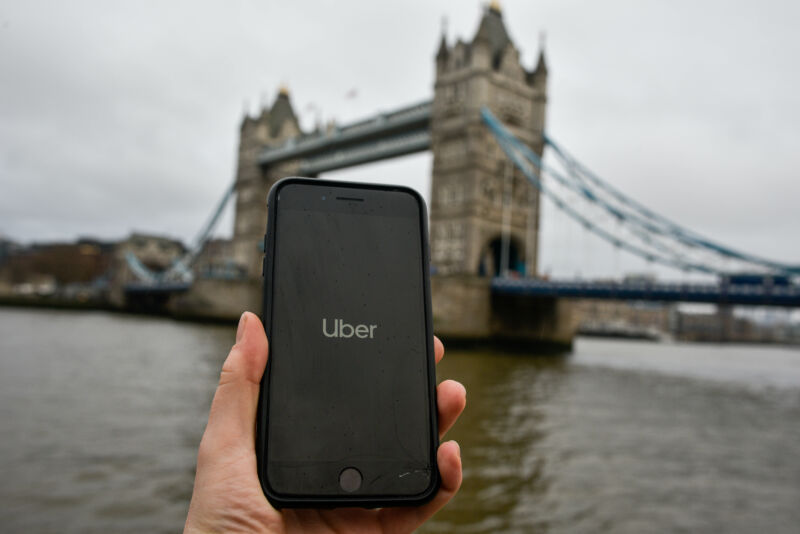
The Supreme Court of the United Kingdom has ruled that Uber drivers are legally workers, not self-employed contractors as Uber has argued in courts around the world. The ruling means that drivers in Britain and Northern Ireland are eligible for additional benefits and protections, including a minimum wage.
Uber claims that it merely acts as a technology provider and broker between independent drivers and their customers—much as eBay facilitates sales between buyers and sellers. In Uber's view, this means that it doesn't owe its drivers benefits like unemployment insurance, doesn't need to reimburse drivers for their costs, and isn't bound by minimum wage and overtime rules. Uber emphasizes that its drivers are free to decide when, where, and how much they work.
But critics point out that Uber exerts a lot more control over its drivers—and over the driver-passenger relationship—than a conventional platform like eBay or Airbnb. Uber sets fares, collects payments from customers, deducts its own fee, and remits the remainder to the driver. It requires drivers to accept a large majority of the rides they are offered. It handles customer complaints and kicks drivers off the platform if their average rating falls too low.
“A position of subordination and dependency”
So the UK Supreme Court ruled Friday that Uber drivers are legally Uber workers, not independent business owners who happen to get most of their business from Uber.
“Drivers are in a position of subordination and dependency in relation to Uber such that they have little or no ability to improve their economic position through professional or entrepreneurial skill,” said Lord George Leggatt, one of the justices of the Supreme Court, as he handed down the ruling.
One consequence is that Uber drivers must be paid at least the minimum wage. And importantly, the high court held that drivers must be paid not only for the time when they're driving but also for time they're logged in to the app waiting for another fare.
This could have significant implications for Uber's relationship to drivers. While drivers will presumably appreciate a minimum earnings guarantee, this could also mean that Uber will restrict when drivers are allowed to work—since having too many drivers online during periods of low demand could cost Uber more than it earns in fares.
According to the Financial Times, the ruling means Uber must set up a pension program for its drivers. Thousands of drivers could be eligible to sue for back pay as a result of the ruling.
A global battle
In recent years, Uber has been fighting over the same issue in jurisdictions around the world. California passed legislation in 2019 requiring Uber (and Lyft) to treat its drivers as employees. Uber and Lyft fought the law in court for the next year, delaying its implementation until voters overturned it in a November 2020 vote.
According to the Financial Times, UK law has three legal categories—employees, workers, and independent contractors. Workers in the UK have more rights than independent contractors, but not as many as employees. Employment law in the US generally just has two categories—employees and independent contractors.
Last year, France's top court ruled that Uber drivers must be treated as employees. Spanish courts reached a similar conclusion in September. Uber is facing a class-action lawsuit in Canada over the same issue.
Uber is also facing litigation in Massachusetts over the legal status of its drivers.
Of course, Uber may ultimately overturn some of these rulings in the courts or national legislatures, or through referenda. But it seems unlikely that Uber will prevail in all of these fights. Which means that unless Uber wants to abandon broad swaths of hard-won territory, it's going to have to figure out how to make its business model work while treating drivers as employees.
That might mean higher prices for consumers and less flexibility for the drivers. But advocates say that drivers will ultimately benefit from having the same legal protections as most other workers.
https://news.google.com/__i/rss/rd/articles/CBMib2h0dHBzOi8vYXJzdGVjaG5pY2EuY29tL3RlY2gtcG9saWN5LzIwMjEvMDIvdWstc3VwcmVtZS1jb3VydC1zYXlzLXViZXItZHJpdmVycy1hcmUtbm90LWluZGVwZW5kZW50LWNvbnRyYWN0b3JzL9IBdWh0dHBzOi8vYXJzdGVjaG5pY2EuY29tL3RlY2gtcG9saWN5LzIwMjEvMDIvdWstc3VwcmVtZS1jb3VydC1zYXlzLXViZXItZHJpdmVycy1hcmUtbm90LWluZGVwZW5kZW50LWNvbnRyYWN0b3JzLz9hbXA9MQ?oc=5
2021-02-19 17:14:54Z
52781387087578
Tidak ada komentar:
Posting Komentar